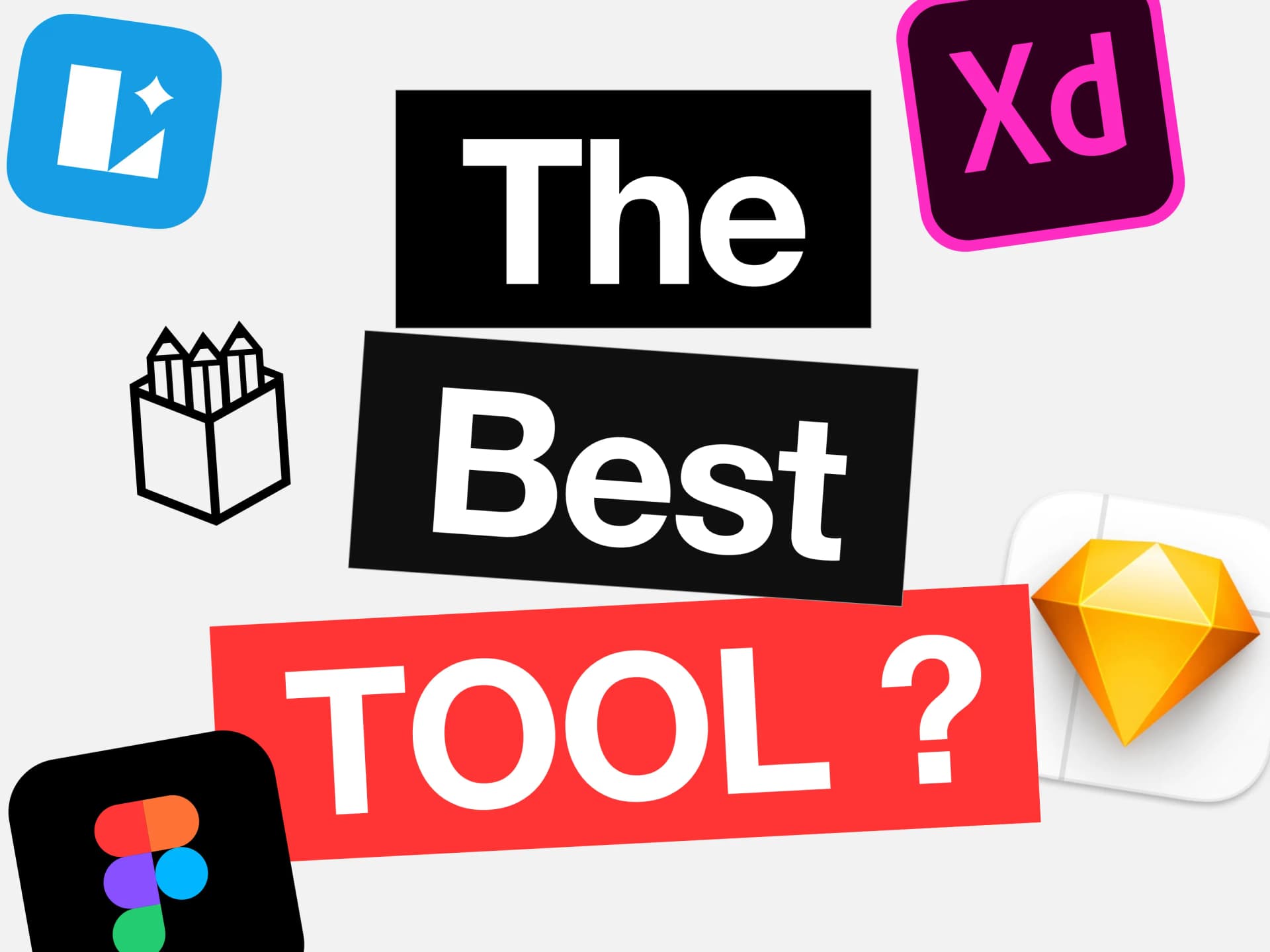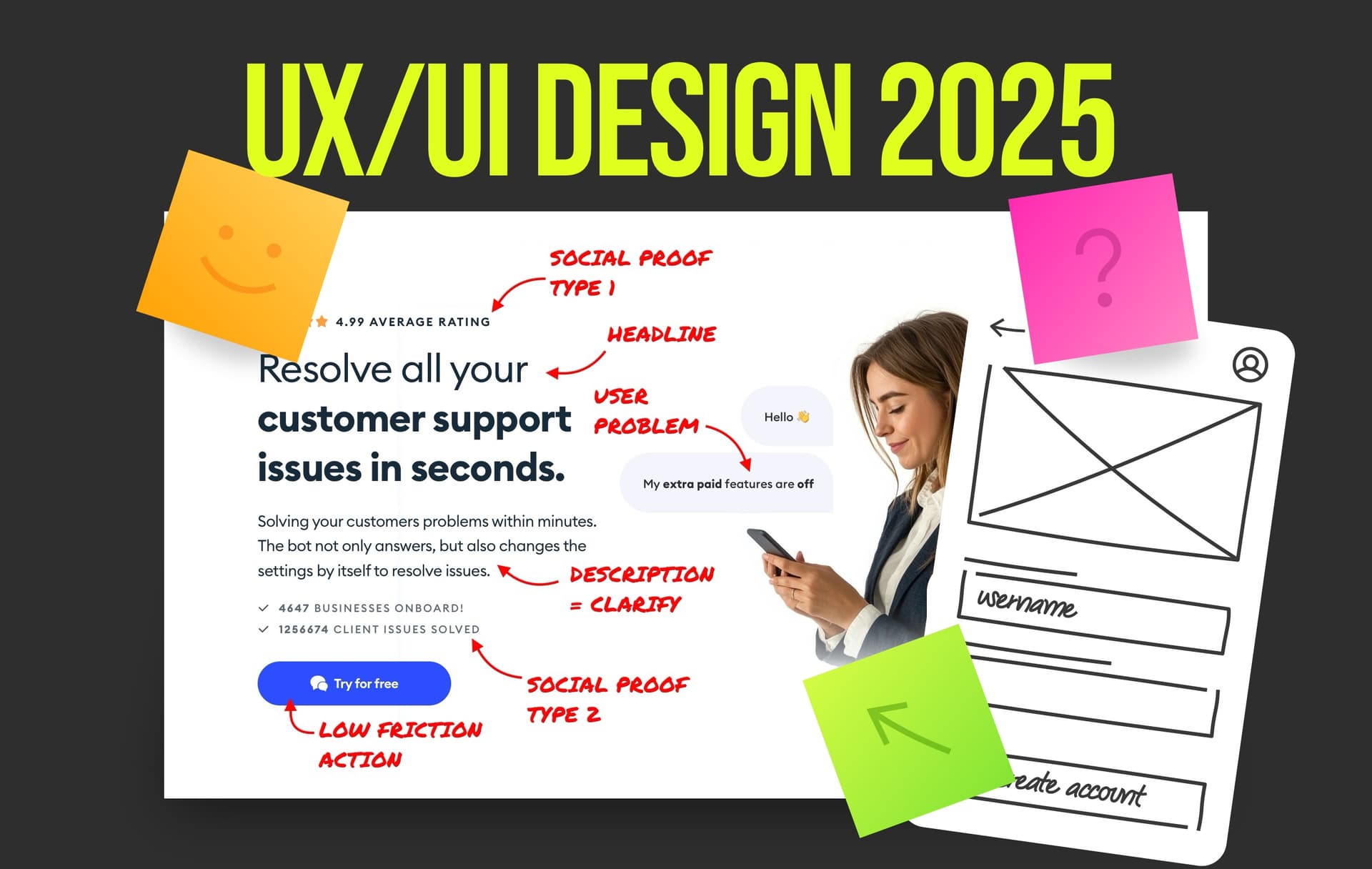User Experience design (or UX) is all about making apps and websites easier to use and better at selling.
And yes, there's more areas of UX, beyond just apps and websites. But 99% of what we know as ux IS apps and websites. Let's not make it more difficult for ourselves shall we?
Some will try to come up with long, winding definitions full of industry jargon. Something about providing meaningful experiences to the users.

I've been a UX designer for the last 25 years. Started back in 1998 and the goal of designing websites (and then apps) was always the same.
Is UX really about the users? You'll be surprised to find out the truth. But first let's go through what a UX designer actually does.
This is an explanation of the job for non-designers. In simple language. Without the filler and pretentious approach that the field is known for.
What is a UX design job about?
For clarity I'll stick to the typical UX job designing apps and websites.
This job is a mix of planning, sketching, making visuals and researching. All that usually happens in a loop.
It often starts and ends with research. You find out what problems the users are facing. Like the website offer is not clear and the buttons not visible enough.
You define those problems and then come up with solutions. In case of offer, you can analyse what people say they need, and rewrite it so it matches. In case of buttons - make them a more vibrant color, or bigger.
Then you make the UI (User Interface) with the proposed changes. Developers take your UI and code it. Users see a new UI.

If all went well there should be an improvement in both what users think and company sales.
This is where you test and research again. Even if you solved some problems, chances are new ones show up to replace them.
The UX process is constantly tweaking stuff. Making it perform even 1% better. It's easier to do that of course once you get the biggest issues out of the way.
Then it slows to a grind of getting even a tiny bit better.

Is it really for the users?
Of course not! That's naive. When you build an app or a website, you want it to make money. Unless it's some fun, non-profit art project.
You are solving the problems of the users, but only so they give you their hard-earned dollars. Which is as noble a profession as any. When you think about it, most jobs revolve around a similar pattern.
Happy users = more sales.

Many to-be designers are drawn to the psychology aspect of UX. They think we're here to make the lives of our users better. Not really. We're here to make it easier for them to solve their problem and pay us.
Many kind souls quit UX after they're hit with this realisation. Especially when they experience their first dark pattern designs.

Do UX designers get paid well?
That depends. There are some articles stating a range of $50K - $200K per year depending on how experienced you are.
I've been doing this for 25 years and recently got an offer for $150K / year in Poland. This shows the industry IS growing, but mostly for senior UX designers.
Juniors in 2025 are in a very bad spot. Nobody wants to hire them and no fancy certificate will change that. I've seen people ask this on reddit a while back.
What kind of salary can you have after getting Google UX Certified. My answer is $0 / year. Certificate won't get you a job.

UX Design roadmap for beginners in 2025
If you're a beginner that wants to become a UX designer this year there are only two paths for you.
Both require you to have a big talent for design. Both also require a great portfolio.
The first one is counting on luck. If you're feeling lucky, go and apply for jobs. You may get one. Unlikely though.
The second one is jumping into the industry from another angle. Become a freelancer. Do some work for non-profits and NGO's. That work is often unpaid. You have to be ready to put in the time without a reward.
After a while progress to some better clients. Build up a freelancing mini-business. Do that for a year or two and you'll be a mid-level designer.
At this point you can either continue doing freelance, or just look for jobs. Chances increase dramatically when you do this.
Same as salaries.

You can start any of those paths with the Google UX Course, but make sure to only do the first parts. Then learn UI somewhere else. Like in our daily design challenges.
What is UX vs UI?
UX vs UI is the age old industry battle that has since become a bit of a joke. User Interface (or UI) is an integral part of User Experience (UX).
When it comes to making apps and websites, if you want a good UX you also need a good UI.
There's simply more to UX itself. Things like research, strategy, copywriting. UI is how it looks like. Including readability, clarity and aesthetics.

Making things pretty, while keeping them functional and easy is the right balance. This balance is the whole UX vs UI debacle. And to find out if something works well you need to first outline what is wrong with it.
You can do it in red marker, like in the example above.
Some hardcore UX'ers try to downplay good UI. One senior I knew ten years ago was especially good at this.
He praised his awesome strategy skills while scribbling wireframes on paper. And then he condescendingly sent those to the UI guys saying stuff like "now use your crayons to make it pretty".
A good UX designer in 2025 has to be a good UI designer. If someone downplays either one, it usually comes from them being insecure.
In other words, they'll likely bad at the other part.

Aesthetic Usability effect
When it comes to UX vs UI there's also a funny effect that takes place. It's called aesthetic usability and it means people perceive pretty things as being better.
Which means at first glance a nice interface will feel like it has better UX than one that's not as nice.
Of course this whole thing can fall apart quickly if the flow is bad. But it's also the reason why UI presenting is such a big thing.
Showing your work in a beautiful way is great if you want to convince stakeholders to pay you more.
Think about it! Aesthetic usability!
Take that grey-wireframes ux'ers!
Who gets paid more, UX or UI?
It's not as simple. The person in this industry that gets paid more is neither UX nor UI.
It doesn't matter if they're more strategic or visual leaning. What matters is whether they can take ownership of their design decisions.
You won't get paid more for constantly nodding and obeying orders.
Designers that thrive are the ones who take action. Of course it can't be random action. It needs to make sense.
That ability to take action comes with experience. After 25 years of doing this I am pretty confident about my design decisions.
What it means is I can propose a strategy quickly. Stick to it. And also have a contingency plan for when my idea fails. How will I fix it? What are other paths we can take?
And if you can make beautiful UI + understand how UX works on top of that most businesses will shower you with gold.
Logic would say UX designers get paid more, because they're more strategy oriented. But I personally know people who just do UI and earn way above average. That's mostly becaue their UI is way above average.
See how that works? The better you are, the more you're paid. Pretty logical.

Is UX design a stressful job?
If your goal is to avoid stress in your life, I have a bit of advice for you. Don't pick any job that involves other people.
UX heavily involves other people. It can be users who can complain about your bad design in public. But what's even worse it can be stakeholders. People in charge of the product who are not UX designers.
If you're freelancing, lots of stress can also come from clients. Unpaid invoices. Bargaining. Mean emails. Super mean feedback once they finally pay.
All that is a part of the job. If you can handle stress, then UX is right for you. But be aware you'll be criticized. A lot. Daily. For years.
If you can't handle criticism, often merged with personal attacks, then UX is likely not the right path for you.
How do I handle stress? I do meditation and breathing exercises. I also learned that most of those situations don't really matter.

We had our share of bad clients too. Sure, we're a successful agency now and can spot a bad seed early on. But sometimes they do slip through the cracks. Yes, we do get "bad clients".
You end up working for someone you're incompatible with and that's never fun.
I am fortunate to be able to fire those clients if I don't want to work with them. But many beginners will be forced to work with nasty people out of necessity.
Is UX stressful? Yes. Not always - of course. But when it gets stressful it can get really bad.
Is UX safe from AI?
Is AI coming to take away your fancy UX job? A popular belief is that UX requires empathy. It means you need to feel the pain of the user to solve their problem well.
AI can't empathise so it won't replace UX designers. That's the most common approach and it's completely wrong.
Sure, AI won't replace psychologists or researchers that talk to people in focus groups.
But most of UX design is now well established patterns. AI can look at user actions and pick a different pattern to compare. If it's better, redesign worked.
And that leads me to the last thing that's mostly misunderstood about UX design.

Is UX innovative?
There's barely any innovation in most of UX. Sure - if you worked for Apple on the Vision Pro, or on the first versions of Chat GPT, that's different.
But most people aren't as lucky to define completely new concepts and experiences.
Most will just be doing apps and websites. All based on the same overall principles most good apps and websites share.
There is potential to innovate slightly, but you won't reinvent the wheel.

Jakob Nielsen, one of the fathers of UX design created a law that talks about it. It's called Jakob's Law (go figure!) and it's all about the benefits of familiarity.
It says that since people spend most of their time on other websites (not yours) you need to make yours feel familiar to those other ones.
There's potential to go outside of the box of course. It becomes clearer with more experience.
But most designers will be stuck moving the same rectangles over and over again. Assembling the same patterns out of them.
Most of UX is far from creative.
But seeing a complete, built app or website that you worked on makes it all worthwhile.





